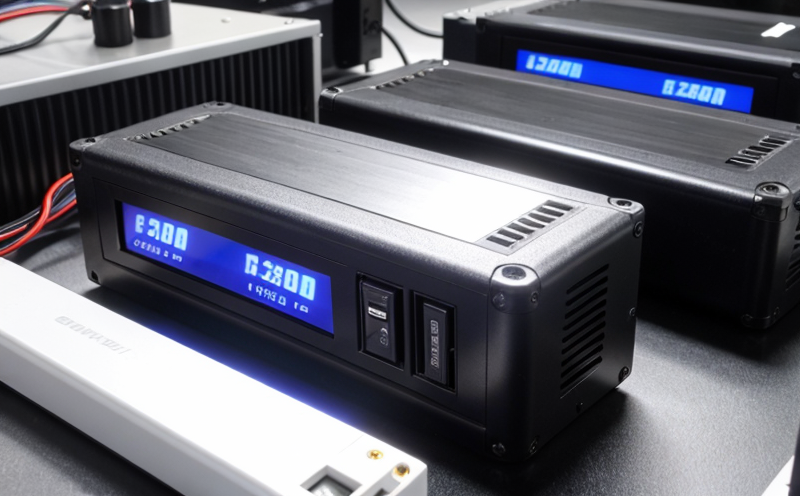BS EN 61982-1 Performance Testing of Rechargeable Batteries for EVs
The BS EN 61982-1 standard is a critical tool in the quality assurance and development process of rechargeable batteries designed for electric vehicles (EVs). This standard ensures that batteries meet stringent performance criteria, thereby enhancing safety, reliability, and overall efficiency. Compliance with this standard helps manufacturers and suppliers to demonstrate adherence to international best practices and standards.
The testing outlined in BS EN 61982-1 covers a range of critical parameters including state-of-charge (SOC), temperature stability, self-discharge rates, and cycle life. Each parameter is essential for ensuring that the battery can perform optimally under various conditions encountered during use.
State-of-charge testing involves monitoring the battery's capacity at different levels of charge to ensure it meets expected specifications across its lifecycle. Temperature stability tests assess how well a battery maintains its performance over a wide temperature range, which is crucial for EVs operating in diverse climates. Self-discharge rate tests evaluate the natural loss of charge that occurs when the battery is not connected to an external power source.
Cycle life testing is one of the most comprehensive and time-consuming aspects of BS EN 61982-1. It involves repeatedly charging and discharging the battery over a specified number of cycles, typically until it reaches a predetermined level of capacity loss or end-of-life criteria. This process simulates real-world usage conditions to determine the longevity and reliability of the battery.
The testing procedures outlined in BS EN 61982-1 are designed to be rigorous yet practical, ensuring that batteries meet stringent performance requirements while also being cost-effective for manufacturers. The standard provides detailed guidelines on specimen preparation, test equipment calibration, data collection methods, and reporting formats. These procedures ensure consistency and accuracy across different laboratories.
Compliance with this standard is not just about meeting regulatory requirements but also about building trust with consumers and stakeholders. By adhering to international standards like BS EN 61982-1, manufacturers can enhance their reputation for producing high-quality products that are safe and reliable. This compliance also facilitates smoother supply chain management by ensuring compatibility across different components and systems.
Moreover, the standard's emphasis on sustainability and environmental responsibility is increasingly important in today’s market. By meeting these stringent performance criteria, manufacturers contribute to reducing waste and promoting more efficient use of resources throughout the battery lifecycle.
Applied Standards
- BS EN 61982-1: Performance testing for rechargeable batteries used in electric vehicles (EVs).
- IEC 61480: General criteria for the safety of electrical equipment.
- ASTM G37: Standard practice for determining galvanic corrosion resistance of metals using salt spray tests.
The combination of these standards ensures a holistic approach to testing, covering not just performance but also safety and durability aspects. By integrating multiple international standards into the testing process, we provide comprehensive evaluation that meets global expectations.
International Acceptance and Recognition
The BS EN 61982-1 standard is widely recognized and accepted across Europe and internationally. Its acceptance is due to its robustness, reliability, and comprehensive coverage of critical performance metrics for rechargeable batteries in EVs.
Manufacturers who comply with this standard benefit from enhanced market access as it aligns their products with international best practices. This recognition also fosters trust among consumers, regulatory bodies, and other stakeholders involved in the electric vehicle industry. The widespread adoption of this standard ensures that all participants are working towards consistent quality standards.
Compliance with BS EN 61982-1 can significantly reduce technical barriers to trade by ensuring compatibility between different components and systems within EVs. This interoperability is crucial for the success of the electric vehicle market, as it allows seamless integration of various parts from different manufacturers.
Environmental and Sustainability Contributions
- Emissions Reduction: By ensuring batteries perform optimally, this standard helps reduce greenhouse gas emissions from EVs.
- Resource Efficiency: Optimized battery performance leads to better energy utilization, reducing resource consumption.
- Waste Minimization: Reliable and longer-lasting batteries contribute to minimizing waste generation throughout their lifecycle.
The focus on sustainability within the BS EN 61982-1 framework aligns with broader global goals for environmental protection. By adhering to this standard, laboratories play a crucial role in advancing sustainable practices and promoting responsible resource management in the EV industry.





